|
|
|
Sort Order |
|
|
|
Items / Page
|
|
|
|
|
|
|
| Srl | Item |
| 1 |
ID:
106886
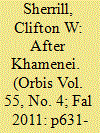

|
|
|
|
|
| Publication |
2011.
|
| Summary/Abstract |
Since succeeding the Supreme Leader Ayatollah Khomeini in 1989, Ali Khamenei has striven to make himself indispensible to the fate of Islamic fundamentalism in Iran. However, the measures Khamenei has taken to secure his power have left his succession in doubt, with no consensus heir. The lack of clear successors among the clergy, weakness of the government institutions, and concerns about regime strength could lead to instability and the potential for an Islamic Revolution Guard Corps coup.
|
|
|
|
|
|
|
|
|
|
|
|
|
|
|
|
| 2 |
ID:
191598
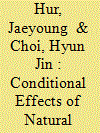

|
|
|
|
|
| Summary/Abstract |
Do natural disasters affect presidential approval ratings? In this study, we argue that in South Korea this relationship is conditional on regional partisan cleavages. Since partisanship induces perceptual biases among distinct social groups, we expect that (1) the president’s co-partisans will not blame their president even if the government fails to prevent or mitigate damage from natural disasters, and (2) human and economic losses from disasters, or delivery of disaster relief aid, may boost approval ratings in partisan strongholds. We test these hypotheses using South Korea’s Park Geun-hye and Moon Jae-in administrations. The results of vector auto-regressions show that regional partisanship toward the incumbent significantly influences job approval ratings in the wake of natural disasters. While public opinion in metropolitan areas was not affected by disaster losses, both presidents’ approval rose after disasters—typhoons and windstorms, in particular—struck their strongholds in the southeastern part of the country.
|
|
|
|
|
|
|
|
|
|
|
|
|
|
|
|
| 3 |
ID:
106057


|
|
|
| 4 |
ID:
124637


|
|
|
|
|
| Publication |
2013.
|
| Summary/Abstract |
It is commonly accepted that leaders play a crucial role in collective action. Existing literature has suggested a number of factors that contribute to the emergence of leaders including, among others, personality, sense of moral responsibility, community pressure, self-interest and institutional exclusion. However, current research tends to suggest that activists are driven by a particular reason to become leaders and that their motivation is static. Based on intensive fieldwork in residential communities in Beijing, this article illustrates that leaders' motivations can be mixed or multiple and that leaders may re-prioritize or adjust their objectives over the course of collective action. The re-prioritizing tends to alter the leaders' behaviour and affect group solidarity and interactions with other group members.
|
|
|
|
|
|
|
|
|
|
|
|
|
|
|
|
| 5 |
ID:
181224
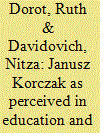

|
|
|
|
|
| Summary/Abstract |
This article examines the similarities and differences between Janusz Korczak’s concept of the teacher and the concept of the teacher in contemporary Israel. It also examines the correspondence between Korczak the man, his principles, and educational endeavours, as well as his portrayal in painting and sculpture. The findings show that the more freely a teacher feels able to work within the education system, the greater the satisfaction. This trend was evident in all three satisfaction criteria: decision-making, general satisfaction, and satisfaction with the students. The findings show that teachers and principals see their role in the way portrayed in the works of art commemorating Korczak and his educational work. This teacher, educational leader and visionary remains relevant to this day, and perhaps now, more than ever.
|
|
|
|
|
|
|
|
|
|
|
|
|
|
|
|
| 6 |
ID:
102330
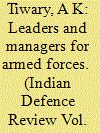

|
|
|
| 7 |
ID:
144088
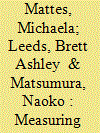

|
|
|
|
|
| Summary/Abstract |
This article introduces the CHISOLS (Change in Source of Leader Support) dataset, which identifies which leadership changes within countries bring to power a new leader whose primary support is drawn from different societal groups than those who supported her predecessor. The dataset covers all countries of the world with populations greater than 500,000 from 1919 to 2008. We discuss the underlying rationale of our data collection, provide some brief information about the coding rules and procedures, and share some descriptive statistics. We find that changes in sources of leader support are more common in democracies than non-democracies, but also that changes in sources of leader support often occur without irregular leader transitions or large institutional changes, even within non-democracies. CHISOLS can be productively combined with other datasets like POLITY, Archigos, and DPI that provide information about political institutions, modes of leader transition, and placement on a left–right policy continuum, but CHISOLS also provides something new that was not previously available. These data allow researchers to study the extent to which different types of policy change are associated with all leader transitions, with changes in political institutions, or with changes in the set of interests that leaders most closely represent; CHISOLS facilitates comparing the effect of leaders, interests, and institutions on policy change across a wide spatial temporal domain.
|
|
|
|
|
|
|
|
|
|
|
|
|
|
|
|
| 8 |
ID:
094709
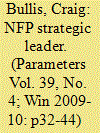

|
|
|
| 9 |
ID:
100799


|
|
|
| 10 |
ID:
170739


|
|
|
| 11 |
ID:
109894
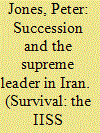

|
|
|
| 12 |
ID:
084470
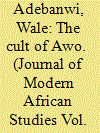

|
|
|
|
|
| Publication |
2008.
|
| Summary/Abstract |
This essay examines the 'posthumous career' of Chief Obafemi Awolowo, the late leader of the Yoruba of Nigeria. It focuses on why he has been unusually effective as a symbol in the politics of Yorubaland and Nigeria. Regarding Awolowo as a recent ancestor, the essay elaborates why death, burial and statue are useful in the analysis of the social history of, and elite politics in, Africa. The Awolowo case is used to contest secularist and modernist assumptions about 'modernity' and 'rationality' in a contemporary African society.
|
|
|
|
|
|
|
|
|
|
|
|
|
|
|
|
|
|
|
|
|